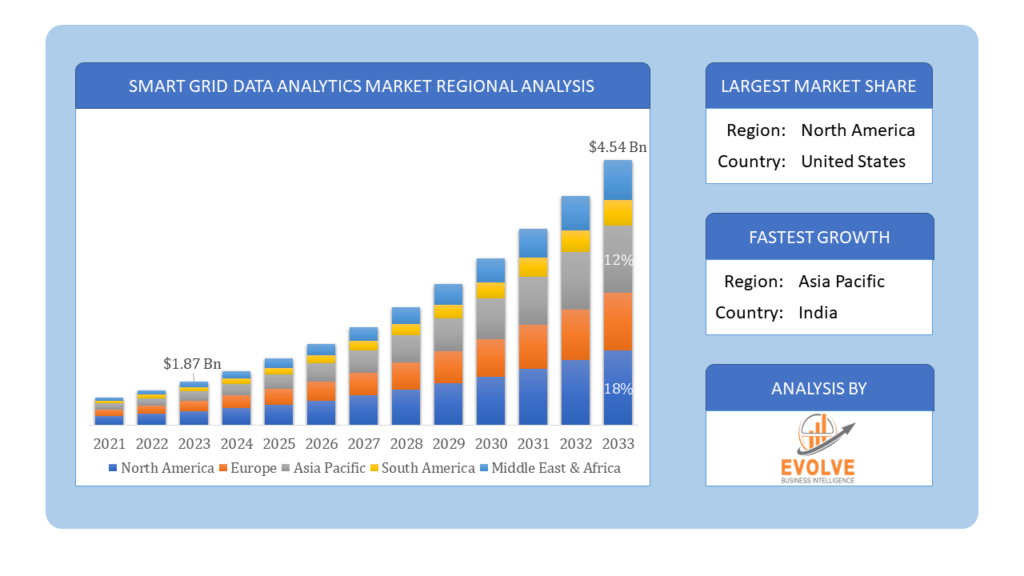Smart Grid Data Analytics Market Analysis and Global Forecast 2023-2033
$ 1,390.00 – $ 5,520.00Price range: $ 1,390.00 through $ 5,520.00
Smart Grid Data Analytics Market Research Report: Information By Deployment (On-Premise, Cloud-Based), By Application (Grid Optimization Analysis, Demand Response Analysis, Advanced Metering Infrastructure Analysis, Others), and by Region — Forecast till 2033
Smart Grid Data Analytics Market Overview
The Smart Grid Data Analytics Market Size is expected to reach USD 4.54 Billion by 2033. The Smart Grid Data Analytics industry size accounted for USD 1.87 Billion in 2023 and is expected to expand at a CAGR of 15.54% from 2023 to 2033. Smart Grid Data Analytics refers to the systematic analysis of large volumes of data generated by smart grid technologies to derive actionable insights aimed at optimizing the performance, efficiency, and reliability of electrical grids. It involves the use of advanced analytics techniques such as machine learning, data mining, and predictive modeling to extract valuable information from various sources including smart meters, sensors, SCADA systems, and other grid devices. The goal of Smart Grid Data Analytics is to enable utilities and grid operators to monitor grid conditions in real time, detect anomalies, forecast energy demand, optimize asset management, improve grid stability, and enhance overall grid operations and planning.
Global Smart Grid Data Analytics Market Synopsis
The COVID-19 pandemic profoundly impacted the Smart Grid Data Analytics market, catalyzing both challenges and opportunities within the industry. Initially, the pandemic led to disruptions in project implementations and installations as restrictions on movement and supply chain interruptions slowed down deployment schedules. However, the crisis underscored the importance of resilient and adaptive energy infrastructure, prompting a heightened focus on grid modernization and efficiency. As a result, there was an increased emphasis on leveraging data analytics to enhance grid operations, optimize energy distribution, and manage demand fluctuations in response to changing consumption patterns during lockdowns. Furthermore, the pandemic accelerated the adoption of remote monitoring and predictive maintenance solutions, driving innovation and investment in smart grid data analytics technologies.
Smart Grid Data Analytics Market Dynamics
The major factors that have impacted the growth of Smart Grid Data Analytics are as follows:
Drivers:
Ø Increasing Integration of Renewable Energy Sources
The transition towards renewable energy sources such as solar and wind power is a significant driver for the Smart Grid Data Analytics market. The intermittent nature of renewable energy generation requires advanced analytics to effectively manage grid stability, optimize energy storage, and balance supply and demand in real time.
Restraint:
- Data Security and Privacy Concerns
The Smart Grid Data Analytics market is concerned with data security and privacy. With the proliferation of smart grid technologies and the collection of vast amounts of sensitive data, there are heightened risks of cyberattacks, data breaches, and privacy violations. Addressing these concerns and implementing robust security measures is essential to foster trust and confidence in smart grid data analytics solutions.
Opportunity:
⮚ Demand Response and Energy Management
The Smart Grid Data Analytics market lies in demand response and energy management initiatives. By leveraging advanced analytics, utilities can optimize energy consumption, reduce peak demand, and incentivize consumers to participate in demand-side management programs. This not only improves grid efficiency but also enhances grid resilience and enables cost savings for both utilities and consumers.
Smart Grid Data Analytics Segment Overview
By Deployment
 Based on Deployment, the market is segmented based on On-Premise and cloud-based. The On-Premise segment within the Smart Grid Data Analytics market is primed for significant expansion due to increasing concerns over data security and privacy, driving demand for solutions that offer greater control and customization of data management and analytics processes. Additionally, industries with regulatory compliance requirements may prefer on-premise solutions to ensure adherence to data governance standards and mitigate risks associated with cloud-based deployments.
Based on Deployment, the market is segmented based on On-Premise and cloud-based. The On-Premise segment within the Smart Grid Data Analytics market is primed for significant expansion due to increasing concerns over data security and privacy, driving demand for solutions that offer greater control and customization of data management and analytics processes. Additionally, industries with regulatory compliance requirements may prefer on-premise solutions to ensure adherence to data governance standards and mitigate risks associated with cloud-based deployments.
By Application
Based on the Application, the market has been divided into Grid Optimization Analysis, Demand Response Analysis, Advanced Metering Infrastructure Analysis, and Others. The Grid Optimization Analysis segment in the Smart Grid Data Analytics market is positioned for substantial growth driven by increasing investments in grid modernization initiatives, rising demand for real-time monitoring and optimization of grid operations, and the adoption of advanced analytics tools to enhance grid reliability, efficiency, and resilience. Additionally, the integration of renewable energy sources and the need for dynamic load management further fuel the demand for grid optimization solutions, driving market expansion in this segment.
Global Smart Grid Data Analytics Market Regional Analysis
Based on region, the global Smart Grid Data Analytics market has been divided into North America, Europe, Asia-Pacific, the Middle East & Africa, and Latin America. North America is projected to dominate the use of the Smart Grid Data Analytics market followed by the Asia-Pacific and Europe regions.
 Smart Grid Data Analytics North America Market
Smart Grid Data Analytics North America Market
North America has consistently retained a dominant position in the Smart Grid Data Analytics market, attributed to its robust investment in grid modernization initiatives, extensive deployment of smart grid technologies, and a mature ecosystem of technology providers and data analytics firms. Additionally, supportive regulatory frameworks and government incentives for energy efficiency and grid optimization further reinforce North America’s leading position in this market.
Smart Grid Data Analytics Asia-Pacific Market
The Asia-Pacific region has experienced a rapid surge in the Smart Grid Data Analytics market owing to extensive investments in smart grid infrastructure, government initiatives promoting energy efficiency and sustainability, and the rapid digitization of utilities, driving demand for advanced analytics solutions to optimize grid operations and manage energy resources efficiently. Additionally, the region’s dynamic economic growth and increasing urbanization have heightened the need for smarter and more resilient energy infrastructure, further accelerating the adoption of smart grid data analytics technologies across various industries.
Competitive Landscape
The Global Smart Grid Data Analytics market is highly competitive, with numerous players offering a wide range of solutions. The competitive landscape is characterized by the presence of established companies, as well as emerging startups and niche players. To increase their market position and attract a wide consumer base, the businesses are employing various strategies, such as product launches, and strategic alliances.
Prominent Players:
- Hitachi ABB Power Grids
- Oracle Corporation
- Schneider Electric
- Itron Inc.
- ABB Group
- SAP SE
- General Electric (GE)
- Cisco Systems Inc.
- IBM Corporation
- Siemens AG
Key Development:
In November 2022, Siemens Smart Infrastructure collaborated with SEW, a leading cloud platform provider specializing in digital customer and workforce experiences for utility providers. This partnership aims to enhance utilities worldwide, elevate the experiences of smart meter users, and facilitate the global transition towards a renewable energy-powered world.
Scope of the Report
Global Smart Grid Data Analytics Market, by Deployment
- On-Premise
- Cloud-Based
Global Smart Grid Data Analytics Market, by Application
- Grid Optimization Analysis
- Demand Response Analysis
- Advanced Metering Infrastructure Analysis
- Others
Global Smart Grid Data Analytics Market, by Region
- North America
- US
- Canada
- Mexico
- Europe
- UK
- Germany
- France
- Italy
- Spain
- Benelux
- Nordic
- Rest of Europe
- Asia Pacific
- China
- Japan
- South Korea
- Indonesia
- Austalia
- Malaysia
- India
- Rest of Asia Pacific
- South America
- Brazil
- Argentina
- Rest of South America
- Middle East & Africa
- Saudi Arabia
- UAE
- Egypt
- South Africa
- Rest of Middle East & Africa
| Parameters | Indicators |
|---|---|
| Market Size | 2033: $4.54 Billion |
| CAGR | 15.54% CAGR (2023-2033) |
| Base year | 2022 |
| Forecast Period | 2023-2033 |
| Historical Data | 2021 |
| Report Coverage | Revenue Forecast, Competitive Landscape, Growth Factors, and Trends |
| Key Segmentations | Deployment, Application |
| Geographies Covered | North America, Europe, Asia-Pacific, Latin America, Middle East, Africa |
| Key Vendors | Hitachi ABB Power Grids, Oracle Corporation, Schneider Electric, Itron Inc., ABB Group, SAP SE, General Electric (GE), Cisco Systems Inc., IBM Corporation, Siemens AG |
| Key Market Opportunities | • Advancements in analytics technologies. • Rising adoption of smart grid solutions worldwide |
| Key Market Drivers | • Increasing integration of renewable energy sources. • Growing demand for grid optimization and resilience. |
REPORT CONTENT BRIEF:
- High-level analysis of the current and future Smart Grid Data Analytics market trends and opportunities
- Detailed analysis of current market drivers, restraining factors, and opportunities in the future
- Smart Grid Data Analytics market historical market size for the year 2021, and forecast from 2023 to 2033
- Smart Grid Data Analytics market share analysis at each product level
- Competitor analysis with detailed insight into its product segment, Government and defense strength, and strategies adopted.
- Identifies key strategies adopted including product launches and developments, mergers and acquisitions, joint ventures, collaborations, and partnerships as well as funding taken and investment done, among others.
- To identify and understand the various factors involved in the global Smart Grid Data Analytics market affected by the pandemic
- To provide a detailed insight into the major companies operating in the market. The profiling will include the Government and defense health of the company’s past 2-3 years with segmental and regional revenue breakup, product offering, recent developments, SWOT analysis, and key strategies.
Press Release

Global Pharmaceutical Manufacturing Market to Reach $1.38 Trillion by 2035 with 7.35% CAGR, New Research Shows

The Global Mammography Market Is Estimated To Record a CAGR of Around 10.29% During The Forecast Period

Glue Stick Market to Reach USD 2.35 Billion by 2034

Podiatry Service Market to Reach USD 11.88 Billion by 2034

Microfluidics Technology Market to Reach USD 32.58 Billion by 2034

Ferric Chloride Market to Reach USD 10.65 Billion by 2034

Family Practice EMR Software Market to Reach USD 21.52 Billion by 2034

Electric Hairbrush Market to Reach USD 15.95 Billion by 2034

Daily Bamboo Products Market to Reach USD 143.52 Billion by 2034

Cross-border E-commerce Logistics Market to Reach USD 112.65 Billion by 2034
Frequently Asked Questions (FAQ)
What is the study period of the Smart Grid Data Analytics Market?
The study period for the Smart Grid Data Analytics Market spans from 2023 to 2033.
What is the growth rate of the Smart Grid Data Analytics Market?
The Smart Grid Data Analytics Market is expected to grow at a CAGR of 15.54% from 2023 to 2033.
Which region has the highest growth rate in the Smart Grid Data Analytics Market?
The Asia-Pacific region has the highest growth rate in the Smart Grid Data Analytics Market.
Which region has the largest share of the Smart Grid Data Analytics Market?
North America holds the largest share of the Smart Grid Data Analytics Market.
Who are the key players in the Smart Grid Data Analytics Market?
Key players in the Smart Grid Data Analytics Market include Hitachi ABB Power Grids, Oracle Corporation, Schneider Electric, Itron Inc., and ABB Group.
Do you offer post-sales support?
Yes, we offer 16 hours of analyst support to solve the queries
Do you sell particular sections of a report?
Yes, we provide regional as well as country-level reports. Other than this we also provide a sectional report. Please get in contact with our sales representatives.
Table of Content
Chapter 1. Executive Summary Chapter 2. Scope Of The Study 2.1. Market Definition 2.2. Scope Of The Study 2.2.1. Objectives of Report 2.2.2. Limitations 2.3. Market Structure Chapter 3. Evolve BI Methodology Chapter 4. Market Insights and Trends 4.1. Supply/ Value Chain Analysis 4.1.1. Raw Material Providers 4.1.2. Manufacturing Process 4.1.3. Distributors/Retailers 4.1.4. End-Use Industry 4.2. Porter’s Five Forces Analysis 4.2.1. Threat Of New Entrants 4.2.2. Bargaining Power Of Buyers 4.2.3. Bargaining Power Of Suppliers 4.2.4. Threat Of Substitutes 4.2.5. Industry Rivalry 4.3. Impact Of COVID-19 on the Smart Grid Data Analytics Market 4.3.1. Impact on Market Size 4.3.2. End-Use Industry Trend, Preferences, and Budget Impact 4.3.3. Regulatory Framework/Government Policies 4.3.4. Key Players' Strategy to Tackle Negative Impact 4.3.5. Opportunity Window 4.4. Distribution Channel Overview 4.5. Macro factor 4.6. Micro Factor 4.7. Demand Supply Gap Analysis of the Smart Grid Data Analytics Market 4.8. Import Analysis of the Smart Grid Data Analytics Market 4.9. Export Analysis of the Smart Grid Data Analytics Market Chapter 5. Market Dynamics 5.1. Introduction 5.2. DROC Analysis 5.2.1. Drivers 5.2.2. Restraints 5.2.3. Opportunities 5.2.4. Challenges 5.3. Patent Analysis 5.4. Industry Roadmap 5.5. Parent/Peer Market Analysis Chapter 6. Global Smart Grid Data Analytics Market, By Deployment 6.1. Introduction 6.2. On-Premise 6.3. Cloud-Based Chapter 7. Global Smart Grid Data Analytics Market, By Application 7.1. Introduction 7.2. Grid Optimization Analysis 7.3. Demand Response Analysis 7.4. Advanced Metering Infrastructure Analysis 7.5. Others Chapter 8. Global Smart Grid Data Analytics Market, By Region 8.1. Introduction 8.2. North America 8.2.1. Introduction 8.2.2. Driving Factors, Opportunity Analyzed, and Key Trends 8.2.3. Market Size and Forecast, By Country, 2023-2033 8.2.4. Market Size and Forecast, By Deployment, 2023-2033 8.2.5. Market Size and Forecast, By Application, 2023-2033 8.2.6. US 8.2.6.1. Introduction 8.2.6.2. Driving Factors, Opportunity Analyzed, and Key Trends 8.2.6.3. Market Size and Forecast, By Deployment, 2023-2033 8.2.6.4. Market Size and Forecast, By Application, 2023-2033 8.2.7. Canada 8.2.7.1. Introduction 8.2.7.2. Driving Factors, Opportunity Analyzed, and Key Trends 8.2.7.4. Market Size and Forecast, By Deployment, 2023-2033 8.2.7.5. Market Size and Forecast, By Application, 2023-2033 8.3. Europe 8.3.1. Introduction 8.3.2. Driving Factors, Opportunity Analyzed, and Key Trends 8.3.3. Market Size and Forecast, By Country, 2023-2033 8.3.4. Market Size and Forecast, By Deployment, 2023-2033 8.3.5. Market Size and Forecast, By Application, 2023-2033 8.3.6. Germany 8.3.6.1. Introduction 8.3.6.2. Driving Factors, Opportunity Analyzed, and Key Trends 8.3.6.3. Market Size and Forecast, By Deployment, 2023-2033 8.3.6.4. Market Size and Forecast, By Application, 2023-2033 8.3.7. France 8.3.7.1. Introduction 8.3.7.2. Driving Factors, Opportunity Analyzed, and Key Trends 8.3.7.3. Market Size and Forecast, By Deployment, 2023-2033 8.3.7.4. Market Size and Forecast, By Application, 2023-2033 8.3.8. UK 8.3.8.1. Introduction 8.3.8.2. Driving Factors, Opportunity Analyzed, and Key Trends 8.3.8.3. Market Size and Forecast, By Deployment, 2023-2033 8.3.8.4. Market Size and Forecast, By Application, 2023-2033 8.3.9. Italy 8.3.9.1. Introduction 8.3.9.2. Driving Factors, Opportunity Analyzed, and Key Trends 8.3.9.3. Market Size and Forecast, By Deployment, 2023-2033 8.3.9.4. Market Size and Forecast, By Application, 2023-2033 8.3.11. Rest Of Europe 8.3.11.1. Introduction 8.3.11.2. Driving Factors, Opportunity Analyzed, and Key Trends 8.3.11.3. Market Size and Forecast, By Deployment, 2023-2033 8.3.11.4. Market Size and Forecast, By Application, 2023-2033 8.4. Asia-Pacific 8.4.1. Introduction 8.4.2. Driving Factors, Opportunity Analyzed, and Key Trends 8.4.3. Market Size and Forecast, By Country, 2023-2033 8.4.4. Market Size and Forecast, By Deployment, 2023-2033 8.12.28. Market Size and Forecast, By Application, 2023-2033 8.4.6. China 8.4.6.1. Introduction 8.4.6.2. Driving Factors, Opportunity Analyzed, and Key Trends 8.4.6.3. Market Size and Forecast, By Deployment, 2023-2033 8.4.6.4. Market Size and Forecast, By Application, 2023-2033 8.4.7. India 8.4.7.1. Introduction 8.4.7.2. Driving Factors, Opportunity Analyzed, and Key Trends 8.4.7.3. Market Size and Forecast, By Deployment, 2023-2033 8.4.7.4. Market Size and Forecast, By Application, 2023-2033 8.4.8. Japan 8.4.8.1. Introduction 8.4.8.2. Driving Factors, Opportunity Analyzed, and Key Trends 8.4.8.3. Market Size and Forecast, By Deployment, 2023-2033 8.4.8.4. Market Size and Forecast, By Application, 2023-2033 8.4.9. South Korea 8.4.9.1. Introduction 8.4.9.2. Driving Factors, Opportunity Analyzed, and Key Trends 8.4.9.3. Market Size and Forecast, By Deployment, 2023-2033 8.4.9.4. Market Size and Forecast, By Application, 2023-2033 8.4.10. Rest Of Asia-Pacific 8.4.10.1. Introduction 8.4.10.2. Driving Factors, Opportunity Analyzed, and Key Trends 8.4.10.3. Market Size and Forecast, By Deployment, 2023-2033 8.4.10.4. Market Size and Forecast, By Application, 2023-2033 8.5. Rest Of The World (RoW) 8.5.1. Introduction 8.5.2. Driving Factors, Opportunity Analyzed, and Key Trends 8.5.3. Market Size and Forecast, By Deployment, 2023-2033 8.5.4. Market Size and Forecast, By Application, 2023-2033 Chapter 9. Company Landscape 9.1. Introduction 9.2. Vendor Share Analysis 9.3. Key Development Analysis 9.4. Competitor Dashboard Chapter 10. Company Profiles 10.1. Hitachi ABB Power Grids 10.1.1. Business Overview 10.1.2. Government & Defense Analysis 10.1.2.1. Government & Defense – Existing/Funding 10.1.3. Product Portfolio 10.1.4. Recent Development and Strategies Adopted 10.1.5. SWOT Analysis 10.2. Oracle Corporation 10.2.1. Business Overview 10.2.2. Government & Defense Analysis 10.2.2.1. Government & Defense – Existing/Funding 10.2.3. Product Portfolio 10.2.4. Recent Development and Strategies Adopted 10.2.5. SWOT Analysis 10.3. Schneider Electric 10.3.1. Business Overview 10.3.2. Government & Defense Analysis 10.3.2.1. Government & Defense – Existing/Funding 10.3.3. Product Portfolio 10.3.4. Recent Development and Strategies Adopted 10.3.5. SWOT Analysis 10.4. Itron Inc. 10.4.1. Business Overview 10.4.2. Government & Defense Analysis 10.4.2.1. Government & Defense – Existing/Funding 10.4.3. Product Portfolio 10.4.4. Recent Development and Strategies Adopted 10.4.5. SWOT Analysis 10.5. ABB Group 10.5.1. Business Overview 10.5.2. Government & Defense Analysis 10.5.2.1. Government & Defense – Existing/Funding 10.5.3. Product Portfolio 10.5.4. Recent Development and Strategies Adopted 10.5.5. SWOT Analysis 10.6. SAP SE 10.6.1. Business Overview 10.6.2. Government & Defense Analysis 10.6.2.1. Government & Defense – Existing/Funding 10.6.3. Product Portfolio 10.6.4. Recent Development and Strategies Adopted 10.6.5. SWOT Analysis 10.7. General Electric (GE) 10.7.1. Business Overview 10.7.2. Government & Defense Analysis 10.7.2.1. Government & Defense – Existing/Funding 10.7.3. Product Portfolio 10.7.4. Recent Development and Strategies Adopted 10.7.5. SWOT Analysis 10.8 Cisco Systems Inc. 10.8.1. Business Overview 10.8.2. Government & Defense Analysis 10.8.2.1. Government & Defense – Existing/Funding 10.8.3. Product Portfolio 10.8.4. Recent Development and Strategies Adopted 10.8.5. SWOT Analysis 10.9 IBM Corporation 10.9.1. Business Overview 10.9.2. Government & Defense Analysis 10.9.2.1. Government & Defense – Existing/Funding 10.9.3. Product Portfolio 10.9.4. Recent Development and Strategies Adopted 10.9.5. SWOT Analysis 10.10. Siemens AG 10.10.1. Business Overview 10.10.2. Government & Defense Analysis 10.10.2.1. Government & Defense – Existing/Funding 10.10.3. Product Portfolio 10.10.4. Recent Development and Strategies Adopted 10.10.5. SWOT Analysis
Connect to Analyst
Research Methodology









